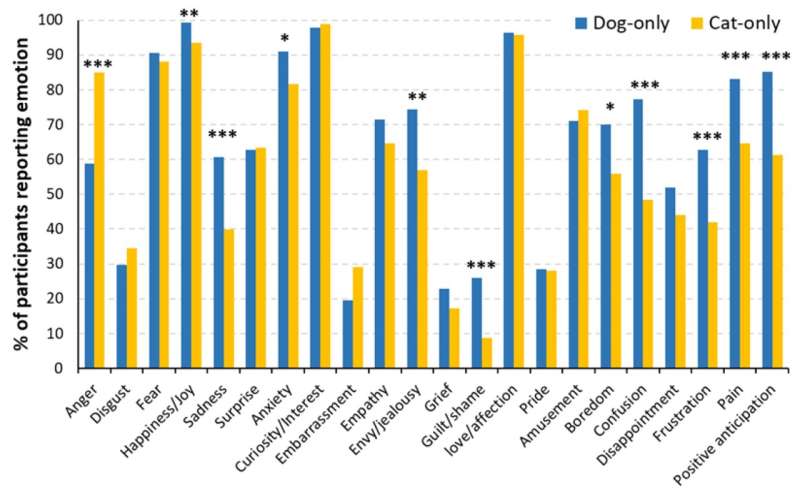This article has been reviewed according to Science X's editorial process and policies. Editors have highlighted the following attributes while ensuring the content's credibility:
fact-checked
peer-reviewed publication
trusted source
proofread
Paws for thought: Is your pet feeling a complex emotion?

Would you be able to identify what emotions your pet is feeling? A team of cognitive neuroscience and animal behavior scientists have discovered that cat and dog owners perceive a variety of emotional states in their animals, ranging from simple to complex.
The team at the University of Lincoln, U.K., surveyed more than 400 cat and dog owners to assess the spectrum of states and behavioral characteristics they discerned in their pets.
The questionnaire included six simple emotions (anger, disgust, fear, joy, sadness, and surprise) and 16 complex emotions (amusement, anxiety, boredom, confusion, curiosity/interest, disappointment, embarrassment, empathy, frustration, grief, guilt/shame, jealousy, love/affection, pain, positive anticipation, and pride).
Findings confirmed that the owners noted a much larger catalog of emotions than had previously been documented, and households with both cats and dogs reported secondary emotions in dogs at a higher rate. The research is published in the journal Animals.
As animal-assisted therapies continue to gain popularity in promoting good mental health and well-being in humans, correctly identifying an animal's emotional state is key to successful human-animal interactions overall.
Scientific research in this field is still in its early stages, meaning that pet owners are currently one of the most reliable sources of information due to the amount of time they spend with their animals.
Daniel Mills, Professor of Veterinary Behavioral Medicine at Lincoln, said, "Assessing owners' impressions of companion animal emotions is an important part of understanding human-animal interactions.
"Problems can arise if an owner misconstrues their pet's emotional state; their perception may not be the same as the reality. For example, if an owner attributed guilt as an emotion in their pet via facial expression and behavioral signals after an episode of misbehavior, they may feel it necessary to reprimand them."
Kun Guo, Professor of Cognitive Neuroscience at the University said, "Animal emotion is at the frontier of our research. Because they are not able to talk, the importance of documenting owners' assessments is the first step in truly being able to identify the internal emotions of our companion animals."
Olivia Pickersgill, Lincoln graduate and Unit Manager at the Waltham Petcare Science Institute in Leicestershire, said, "Despite owner's interpretation of animal emotions being a critical data source, it isn't without its flaws.
"Our research highlights that we view dogs and cats very differently with regard to emotions, suggesting a potential species bias, which could prove problematic for our pets."
More information: Olivia Pickersgill et al, Owners' Beliefs regarding the Emotional Capabilities of Their Dogs and Cats, Animals (2023). DOI: 10.3390/ani13050820
Journal information: Animals
Provided by University of Lincoln



















